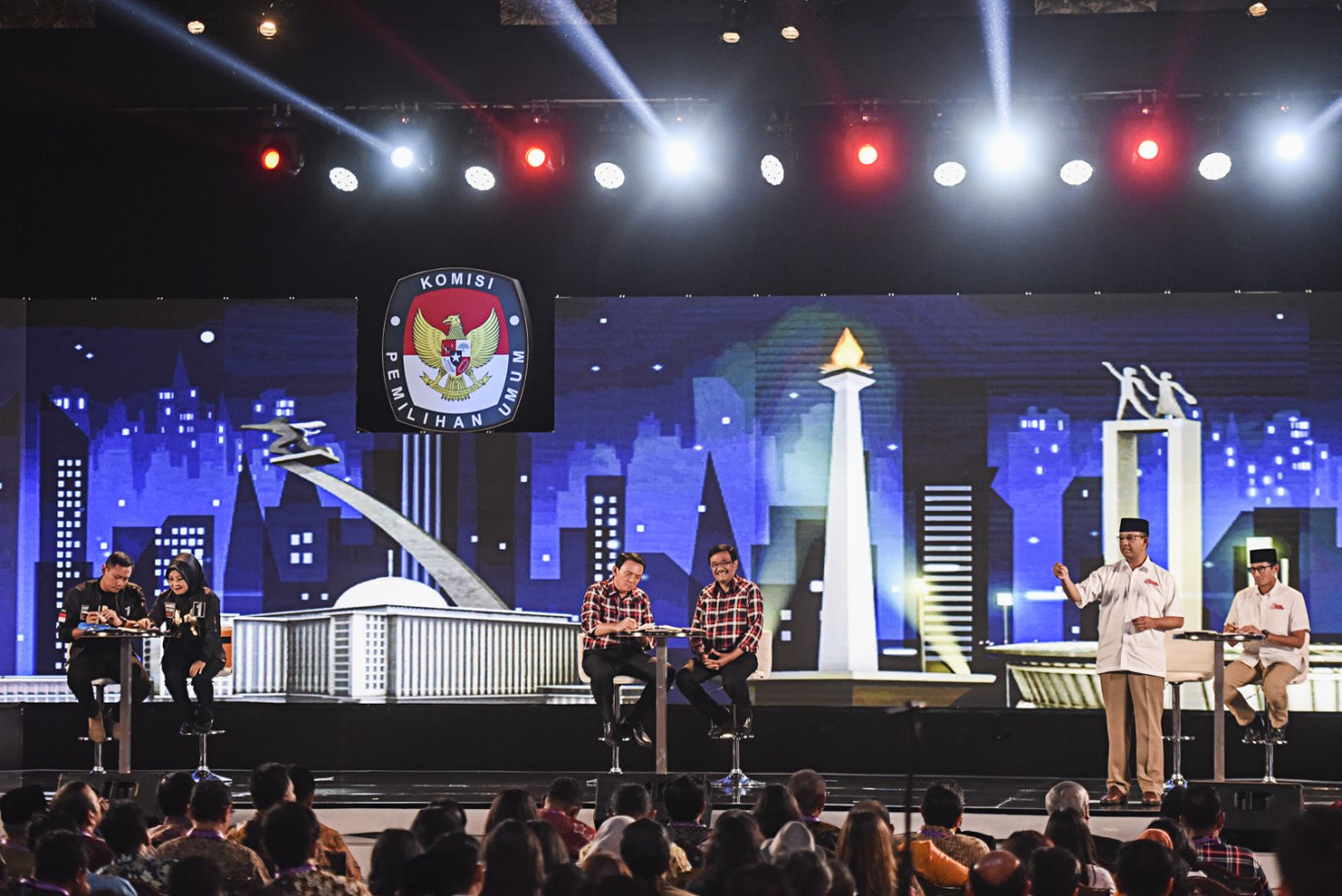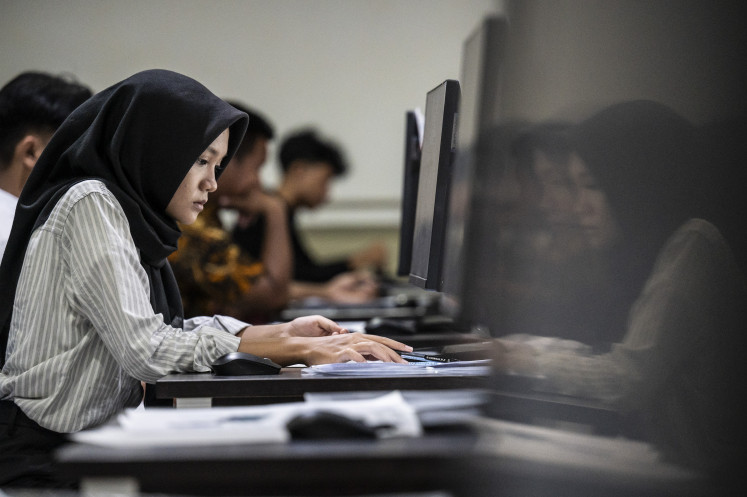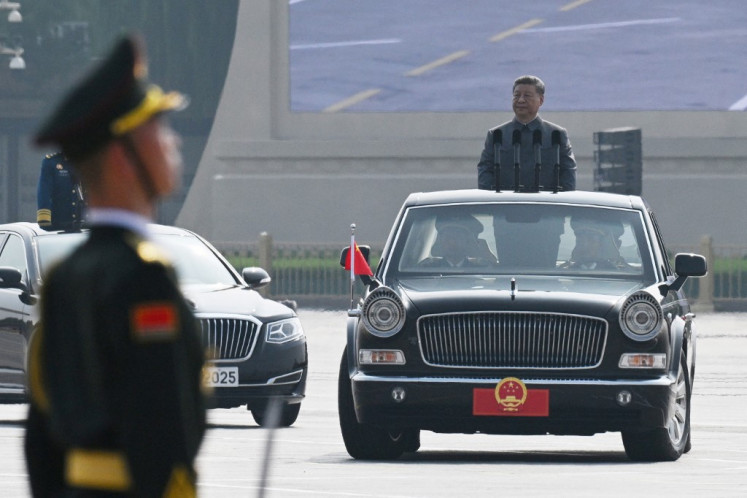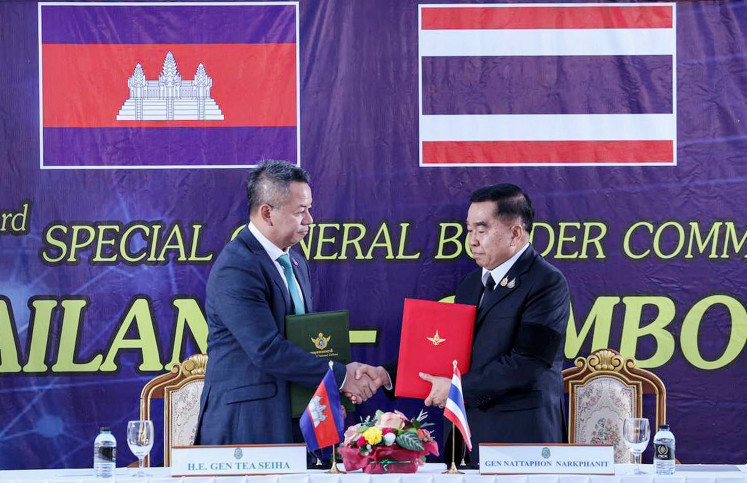Popular Reads
Top Results
Can't find what you're looking for?
View all search resultsPopular Reads
Top Results
Can't find what you're looking for?
View all search resultsFighting for democracy and openness in 2017
Finally, in the first televised debate Anies spoke negatively about foreigners in Jakarta, and the statement infuriated my foreign friends, as well as Indonesians with foreign parents or spouses. His apologists stated that he was talking about illegal immigrants and undocumented aliens, but this was a bad defense for two reasons.
Change text size
Gift Premium Articles
to Anyone
“These are the times that try men’s souls,” so said American author Thomas Paine in The American Crisis, his series of pamphlets written at the low point of the American Revolution. Now, 240 years later, his words resonate as democracy and openness are again on the defensive.
Democracies bloomed after World War II and subsequently after the Cold War. By the early 2000s, democracy had become the most attractive form of government, including in Indonesia, and even autocracies and dictatorships had to pretend that they were democracies, along with sham elections, a neutered opposition and press, and even “Democratic” in their official names.
By the end of the 2000s, however, the spread of democracy had stalled. The rise of China in the global economy, coupled with the Great Recession in the West, offered an alternative political model to the Western model of democracy and free society. The Arab Spring of 2011 didn’t necessarily lead to the democratization of the Middle East and North Africa, and in fact led to more chaos and oppression, except in Tunisia.
The United States and the European Union passed through the economic crises by 2012, despite facing a crisis of trust in their respective governments. Conservatives believed the government squandered national budgets in vain efforts to help lazy citizens and foreigners, while socialists believed that the rich went unpunished despite their greed and selfishness.
The road to 2017 is full of both warning signs and blind spots. On one hand, trust in democracy declined in Western countries, ironically during the economic recovery. Social media provided access, propaganda and materials for chauvinists of the world, including in Indonesia. Xenophobic online campaigns against Chinese-Indonesians were rampant during the Jakarta gubernatorial election of 2012 and the presidential election of 2014. Anti-migrant marches were held across Southeast Asia in those years.
On the other hand, the early and mid-2010s were years of increasing life expectation, safety and life quality across the world. More Indonesians had access to broadband internet, affordable health care and higher education. Social media provided access, ideas and materials for progressives across Indonesia and connected Indonesians with capitals, links, and audiences across the world. Until today, Indonesia is still a role model in democracy and openness for the Muslim world, the Global South and Asia.
And yet, a dark cloud floats above Jakarta. The 2017 gubernatorial election was supposed to be a win-win affair. Whoever won, Jakarta would be in the hands of a youthful, energetic and mainstream governor.
This is no longer the case as Governor Basuki “Ahok” Tjahaja Purnama is standing trial for blasphemy. The trial has damaged his popularity and legitimacy and the poisoned the atmosphere of the election. Many foreigners, of course, cannot comprehend how accusations of blasphemy could be a serious legal issue in a country still mired in corruption, incompetence and a lack of basic infrastructure.
Then the Islam Defenders Front (FPI) organization came on stage, strengthening the suspicion that the whole scandal involved dirty tricks designed to crush Ahok’s chances of governing Jakarta for the next five years. Worse, this might be the first act of a plan to defeat President Joko “Jokowi” Widodo’s re-election bid in 2019. We were dismayed with what happened in US in late 2016. Suddenly we are facing the same danger in our own home.
Anies Baswedan used to be a practical option for many people who were worried that Agus Yudhoyono might stand for conservatism, while Ahok neglected the human toll of Jakarta’s development. Unfortunately, his recent meeting with the FPI, supposedly to confirm his faith as a Sunni Muslim, dismayed many who thought he was the right choice.
Finally, in the first televised debate Anies spoke negatively about foreigners in Jakarta, and the statement infuriated my foreign friends, as well as Indonesians with foreign parents or spouses. His apologists stated that he was talking about illegal immigrants and undocumented aliens, but this was a bad defense for two reasons.
First, such statements are often used by Western politicians to generalize all immigrants and their offspring as “illegals,” portraying naturalized citizens and secondgeneration citizens (or even racial and religious minorities) as perpetual foreigners. It is just plain racism. Worse, such statements are often used as a dog whistle — a seemingly general statement that is an important signal for an insider group — among ultranationalists in many countries.
In the Indonesian context, there is a belief that a Chinese-Indonesian is never a proper Indonesian. Recently the hysteria that millions of Chinese migrants are swamping Indonesia (like the anti-refugee scare in the West) has been spread not only to attack the President’s and the governor’s performances, but also to portray millions of Chinese-Indonesians as foreigners, denying their status as Indonesian citizens.
Second, Indonesians should reject xenophobia. There should not be any sympathy for such statements. Foreign sex workers are not dangerous to Jakarta — local organized crime gangs making profits through people-trafficking are the danger.
We must stop this streak of ethnic nationalism and traditionalism and defend democracy and openness now. My socialist friends in the US had reservations about presidential candidate Hillary Clinton and are now paying the price. My socialist Jakartan friends have reservations about Ahok and I understand their views, but Jakarta cannot afford to fall into the hands of racists and extremists. If Jakarta falls, Indonesia will fall. If you want to turn back the tide of ultraconservatism in the world, it must begin in Jakarta.
***
The writer is a columnist for feminist website Magdalene.co. The views expressed are his own and does not reflect the website’s view.
---------------
We are looking for information, opinions, and in-depth analysis from experts or scholars in a variety of fields. We choose articles based on facts or opinions about general news, as well as quality analysis and commentary about Indonesia or international events. Send your piece to community@jakpost.com. For more information click here.










